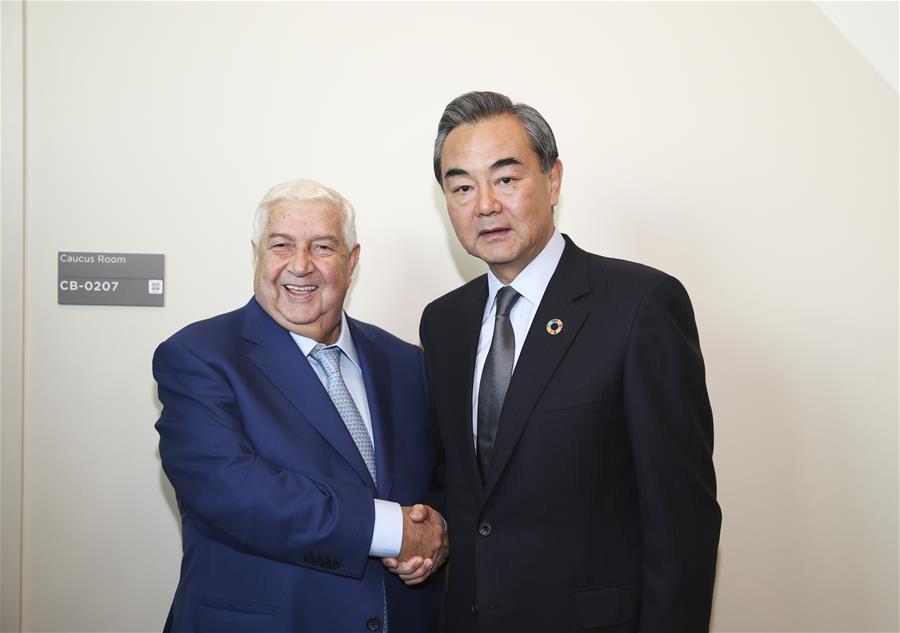The future of Syria and China's role
- By George N. Tzogopoulos
 0 Comment(s)
0 Comment(s) Print
Print E-mail China.org.cn, February 4, 2018
E-mail China.org.cn, February 4, 2018

The future of Syria is highly dependent on the potential success of both of the so-called Geneva and Astana processes. The recent negotiations in Vienna and Sochi respectively produced no breakthroughs though. The impasse beginning seven year ago with the outbreak of the dramatic civil war seems to have no visible endpoint. The lack of communication – if not the lack of real contact – between the Syrian government and opposition forces either under the UN auspices or under the umbrella of the Russian-Turkish-Iranian diplomatic scheme constitutes perhaps the most important obstacle.
In parallel with this problematic situation, the ongoing Turkish-American disagreement over the providing of U.S. arms to the Syrian Democratic Forces (SDF) adds to the current instability. Ankara accuses Washington of arming the Kurdish People's Protection Units (YPG), a component of the SDF. Specifically, it is considering YPG a terrorist organization with closed links to the Kurdistan's Workers Party which is accused of inciting separatism within Turkey. Ankara has received several promises by Washington to stop supplying YPG with arms, yet remains suspicious.
In theory, Turkey's military operation "Olive Branch" in Afrin – a northwestern district of Syria – is targeting the YPG and also the Islamic State. Despite some criticism, no permission by other powers was required in the words of its Foreign Minister Mevlut Çavusoglu because his country was under threat. Nevertheless, an important question remains unanswered: How far is Turkey determined to militarily advance in Syria? President of France Emmanuel Macron, for instance, has warned it not to become involved in an invasion operation.
Officially, Turkey is saying that the "Olive Branch" will not expand beyond Afrin but is not excluding military action in Manbij and generally in the eastern part of the Euphrates in case its national interests are jeopardized. This could bring Turkish forces in confrontation with American troops stationed there. Newsweek magazine is sharing concerns over whether the U.S. would engage Turkey. Presidents Tayyip Erdogan and Donald Trump have clearly disagreed on this subject.
From another perspective, Russia is valuing its cooperation with Turkey more than that with the Syrian Kurds. "Olive Branch" would have been a non-starter from the beginning without the consent of Russia. That is because a basic presupposition for the operation was the use of Syrian airspace by the Turkish Air Force. As a result, the Syrian Kurds openly complained to Russia regarding its stance. It is evident that Moscow seeks to prevent any disruption in its relations with Ankara in a period during which their bilateral cooperation is harmoniously progressing.
The energy sector is an example. Only a few days ago Gazprom received authorization from Turkish authorities to build the second line of the offshore segment of the Turkish Stream gas pipeline to the Turkish coast. Some other analysts see a different Russian motivation in Syria. Moscow's goal, they say, is to win Ankara's support for the keeping – albeit temporarily – of Bashar al-Assad in power. Whatever the explanation is, the two sides are collaborating well in Syria for the time being.
Moreover, Israel's strategic interests in Syria cannot be ignored. Its Prime Minister Benjamin Netanyahu is in open communication with President Vladimir Putin on the future status of Syria. He recently travelled to Moscow for this reason. Israel does not want to see Iran strengthen its role in Syria and terror organizations exploit the continuous destabilization and plot new attacks against the Jewish state. Additionally, it is supporting the Syrian Kurds as it views them as the comparatively more moderate units in the Syrian opposition. Talks between Netanyahu and Putin have been difficult but fruitful.
Seeing the Syrian chaos, China is endeavoring to play a constructive role and help mediation initiatives. It constantly pushes for a political settlement and a ceasefire via the platforms of the Geneva and Astana talks and warns against the possibility of separation. The appointment of its special envoy Xie Xiaoyan outlines the interest of Beijing to participate in rebuilding Syria. Further to this, it is actively contributing to the reconstruction of Syria.
The Chinese government is providing humanitarian aid through institutions such as the World Health Organization (WHO), the World Food Programme (WFP) and the International Committee of the Red Cross (ICRC). Last but not least, it has signed assistance grants agreements with the Syrian government while President Xi Jinping announced last year from the UN headquarters in Geneva that his country would provide $29.1 million in help to refugees and the homeless in the Syrian crisis.
As the civil war in Syria continues to unfold and a new conflict in Manbij possibly approaches, responsibility at both the domestic and the international levels is missing. Stability, peace and prosperity are more significant than temporary political gains fueling intransigence. China's inspired "Belt and Road" initiative is offering an original symbiosis model among different countries, cultures and religions in the wider Middle East region. Although currently impossible, it will be promising for it to safely pass by Syria in the future.
George N. Tzogopoulos is a columnist with China.org.cn. For more information please visit:
http://www.china.org.cn/opinion/GeorgeNTzogopoulos.htm
Opinion articles reflect the views of their authors, not necessarily those of China.org.cn.






Go to Forum >>0 Comment(s)